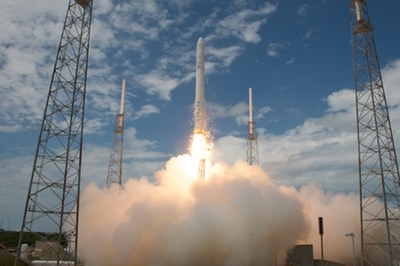Commercial space, what’s good for Florida, and 2012by S. Alan Stern
|
| This has the opportunity to create a Florida space economy that will be far more robust than any in the past 50 years. |
Suborbital Spaceflight: This new sector has over $1 billion in private investment behind it among five separate suborbital space lines (XCOR Aerospace, Virgin Galactic, Blue Origin, Armadillo Aerospace, and Masten Space Systems), each of which plan to begin flying frequent tourist and research missions as soon as 2012 or 2013; several have shown interest in flying from the Cape.
Orbital Launch: Here, a company called SpaceX is taking the lead by pouring hundreds of millions of private dollars into its line of Falcon launchers, which are already flying, and which are under contract by NASA, DOD, and commercial satellite companies. New commercial launchers that could base in Florida are also under consideration by Virgin Galactic and XCOR, and United Launch Alliance hopes to launch commercial and government astronauts aboard Atlas V vehicles from the Cape by 2015.
Crew Transport: Four companies (Sierra Nevada, Boeing, SpaceX, and Blue Origin) are vying to become one of NASA’s astronaut transportation service providers to the International Space Station, which will relieve us from paying the Russians hundreds of millions to get our astronauts to space. These firms hope to also exploit purely commercial markets to transport tourists, researchers, and commercial research equipment to low Earth orbit. Satellite and payload integrators such as Astrotech and Astrogenetix will also benefit from this effort. A recent market survey showed that that these commercial applications are likely to outstrip NASA’s crew transport demands.
Private Space Stations: At least two companies (Bigelow Aerospace and Excalibur Almaz) are planning to field space stations. Both will earn their revenues from private sector and from the approximately 180 nations that are not a part of the International Space Station, and Bigelow has already put two test stations in orbit.
These commercial space activities have the potential to create numerous manufacturing, launch, and operations jobs in Florida, and also create engineering services, hotel, and restaurant jobs, and possibly even new entertainment-themed attractions. These will significantly blunt the blow of the shuttle’s demise.
Watching this exciting new industry develop, one can hardly help but root for its success. And doing so are Space Florida, numerous elected officials in Tallahassee, and many in the state’s congressional delegation.
| Watching this exciting new industry develop, one can hardly help but root for its success. |
Earlier this month, I and several others spoke in the Florida Forward public event in Orlando, in which Senator Bill Nelson outlined his work to forge a space future via the new NASA authorization bill he helped write. Authorization bills are important legislation, but they do not appropriate funds—appropriations bills do that. So the Senator must now work to pass appropriations for commercial space activities that can bring needed jobs to Florida. I, for one, offer to help.
Sen. Nelson has been a leader who other senators turn when considering issues relating to space. With NASA’s crucial commercial space budget under attack, Nelson has a golden opportunity to lead the funding fight for this funding. If he does, he’ll be putting an ace in his deck for the 2012 campaign. If he doesn’t, he’ll cede this powerful card to others, including those who seek his Senate seat.
